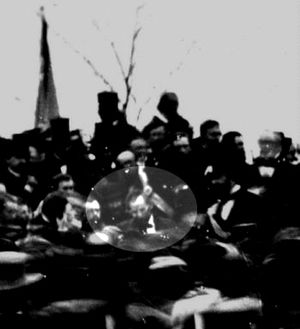 I’m off to Kansas City, where I’ll be lecturing tonight about Duke (about which more here). From there I fly to Miami, with an intermediate stop in Smalltown, U.S.A., my first visit there since my mother’s funeral. I return to Connecticut and Mrs. T late Sunday night.
I’m off to Kansas City, where I’ll be lecturing tonight about Duke (about which more here). From there I fly to Miami, with an intermediate stop in Smalltown, U.S.A., my first visit there since my mother’s funeral. I return to Connecticut and Mrs. T late Sunday night.
For all these reasons, you won’t be hearing anything more from me in this space until next week, save for the usual almanac entries and theatre-related postings.
See you around.
Archives for November 20, 2013
TT: Thoughts on another anniversary
 Any critic who’s forced to write short can’t help but find inspiration in the Gettysburg Address. Has anyone said more in fewer words? On the other hand, as Aaron Copland said of the music of Mozart, “Any incommensurable thing sets up within us a kind of despair.” What can a lesser writer possibly hope to learn from the Gettysburg Address beyond the painfully obvious fact that he’s not Abraham Lincoln?
Any critic who’s forced to write short can’t help but find inspiration in the Gettysburg Address. Has anyone said more in fewer words? On the other hand, as Aaron Copland said of the music of Mozart, “Any incommensurable thing sets up within us a kind of despair.” What can a lesser writer possibly hope to learn from the Gettysburg Address beyond the painfully obvious fact that he’s not Abraham Lincoln?
This is how Copland put it in an essay called “At the Thought of Mozart”:
Paul Valéry once wrote: “The definition of beauty is easy: it is that which makes us despair.” On reading that phrase, I immediately thought of Mozart. Admittedly, despair is an unusual word to couple with the Viennese master’s music. And yet, isn’t it true that any incommensurable thing sets up within us a kind of despair. There is no way to seize the Mozart music. This is true even for a fellow-composer, any composer–who, bring a composer, rightfully feels a special sense of kinship, even a happy familiarity, with the hero of Salzburg. After all, we can pore over him, dissect him, marvel or carp at him. But in the end there remains something that will not be seized. That is why, each time a Mozart work begins–I am thinking of the finest examples now–we composers listen with a certain awe and wonder, not unmixed with despair. The wonder we share with everyone; the despaire comes from the realization that only this one man at this one moment in musical history could have created works that seem so effortless and so close to perfection. The possession of any rare beauty, any perfect love, sets up a similar distress, no doubt….
That’s how I feel about the A Major Piano Concerto–and the Gettysburg Address. Mostly they inspire and console me, but they also remind me of the terrible, irreducible fact of human inequality, which isn’t quite what Lincoln had in mind. We are not what he was, or what Mozart was. All we can do is be who we are–and aspire, on occasion and insofar as possible, to be something better, something more.
* * *
Vladimir Horowitz plays the slow movement of Mozart’s A Major Piano Concerto, K. 488:
Charles Laughton recites the Gettysburg Address in Ruggles of Red Gap, filmed in 1935:
TT: Snapshot
Courtesy of Marc Myers, Peggy Lee sings “Baubles, Bangles, and Beads” in 1959:
(This is the latest in a series of arts-related videos that appear in this space each Monday and Wednesday.)
TT: Almanac
“Granted that theatre, if it was good, was a distillation of life, the two were not interchangeable. There was always exaggeration in the theatre, and necessarily insincerities gave an illusion of truth. No living people were ever so good or so bad as those who spoke the lines.”
John P. Marquand, Women and Thomas Harrow
